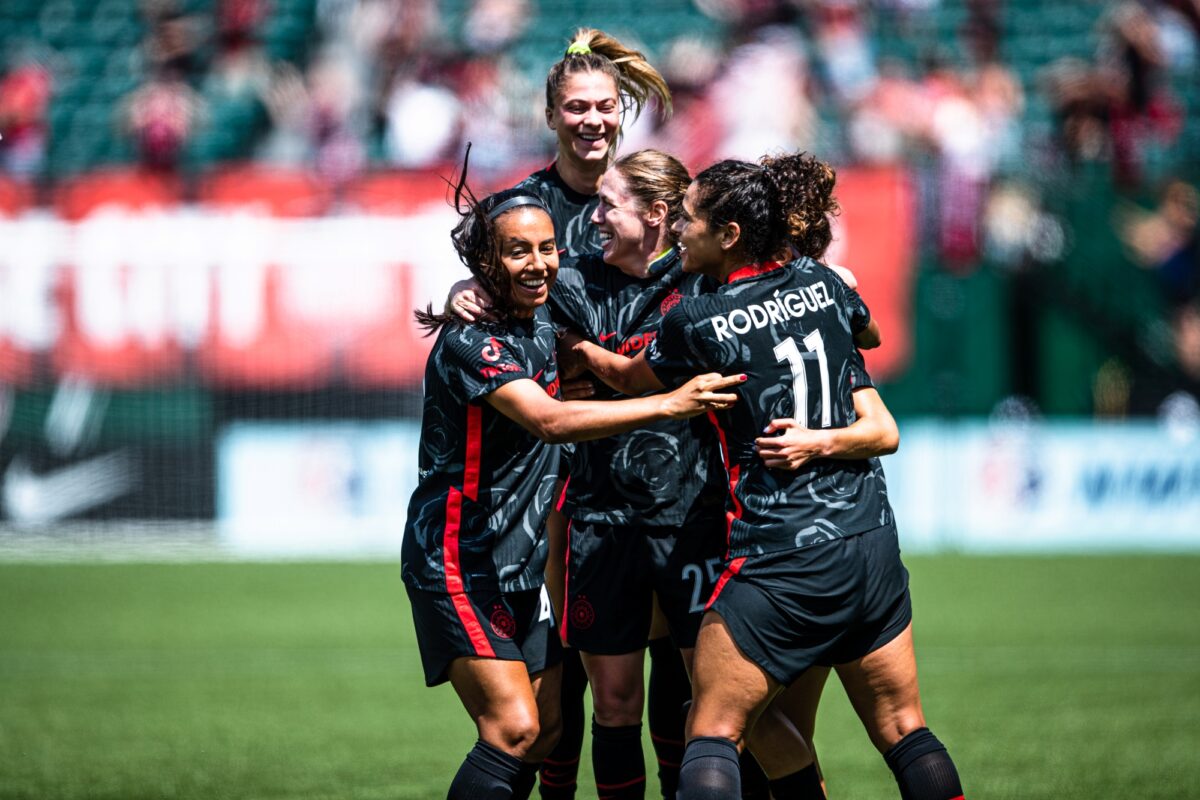To view this content, you must be a member of the Rose City Review Patreon
Already a qualifying Patreon member? Refresh to access this content.
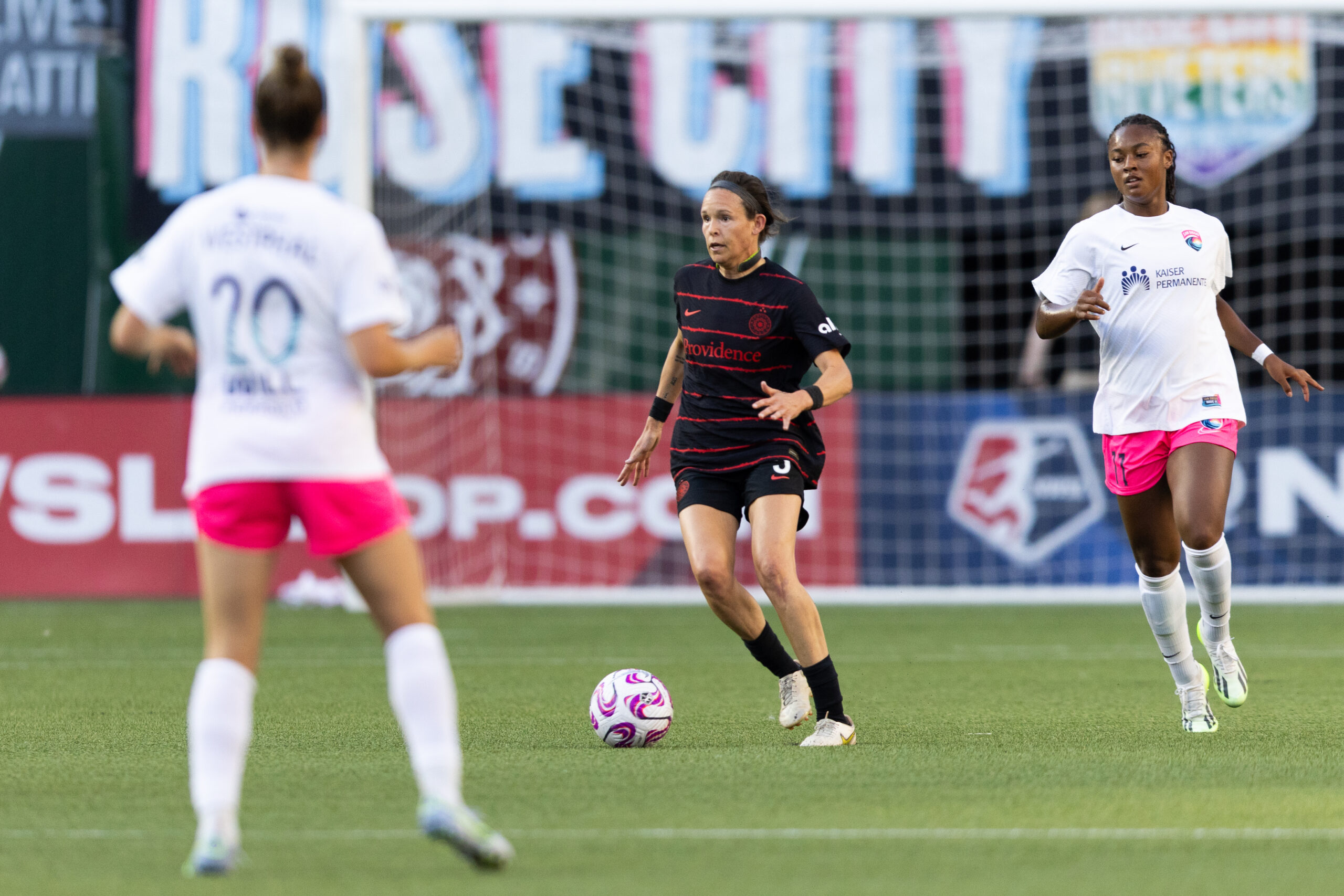
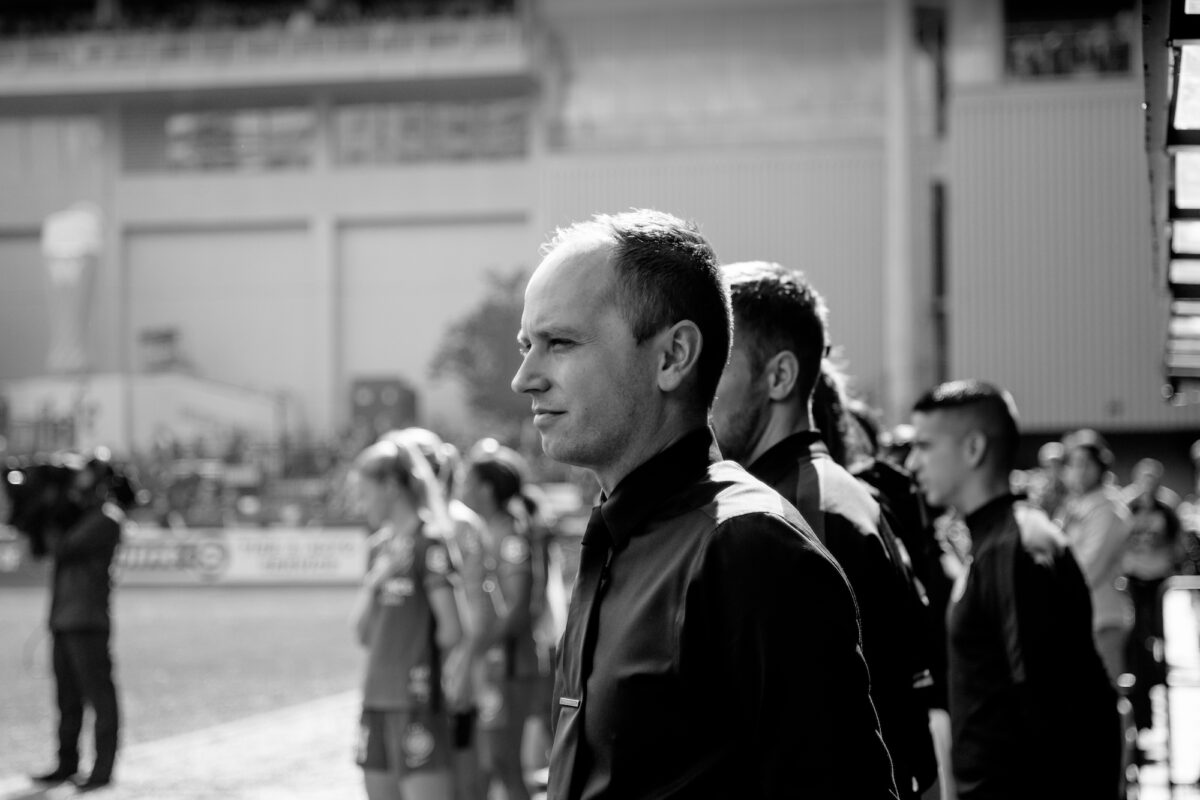
I tried to write about Mark Parsons, who recently completed his sixth and final season as the coach of the Portland Thorns. It didn’t work. Instead I just thought about the passage of time and my experience of it. That’s what this is:
I was 16 the first time I felt old. I was in the hall at South Eugene High School and something involving a slightly younger person happened—I have completely forgotten what—but I remember with crystalline clarity that suddenly I felt like this:
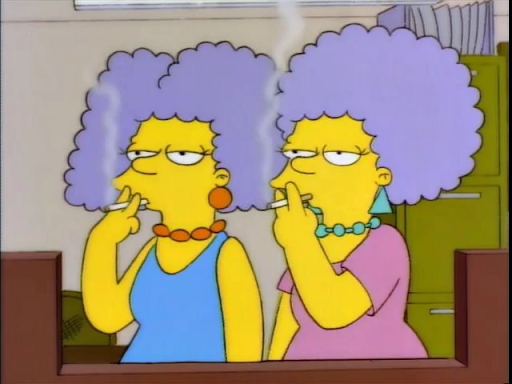
It’s absurd to feel old at 16, or perhaps any of the ages that I have been thus far. But the essence of feeling old has nothing to do with objective age. It’s about being old-er. Thus, it is possible to feel old at almost any age. One of the main ways to feel old is what I felt in the hallway that day: realizing that you know things that younger people do not.
Sometimes you look at a younger person and think, “How could you care so much about [thing]?” Sometimes you look at them and think, “Good lord, don’t do that.” Sometimes, a little cruelly, it’s “Just wait until [bad thing happens].”
The other face of feeling old (aside from mysterious bodily pain, which I would not experience until some years after the hallway incident) is the sense that the world and the people in it have shifted under your feet. You drive by a house you used to live in and it’s been painted and had all the leaky windows replaced, or it’s not a house at all anymore, it’s a condo. You go to a Thorns game and it hits you—feeling old always hits you all at once, never incrementally—that there are only two players on the roster who were there when you started your foolish little hobby of writing about them whether anybody wanted you to or not.
This is all a roundabout way of saying: things change. The “they knocked my old house down” feeling and the “what do you kids know” feeling are two sides of the same coin. Something goes away, something else gets renewed. Everything dies, and the wellspring of youth is infinite. That’s all you can count on.

Where is the essence of a soccer team to be found? Is it in the players? The stadium? The manager? The ownership? The fans? Clearly not: almost all of those things have changed for the Thorns over the last six years. If they are all changeable, how can we say that a club that exists today also existed nine years ago? 20? 100?
During the pandemic, I aged a good 10 years. That was the effect of more or less sitting in my house doing absolutely fuck all for something like 15 months. What I mean is that the experience was ultimately good for me.
For instance, one night last spring I realized that I’d been waking up with a vague fear tickling at the corners of my mind every day for months. Upon reflection, I realized that the fear was the fear of death, that it was probably time to deal with that fear head on, and further, that nothing in my life had given me the tools to do so. I decided to look for God.
In that hallway at South Eugene High School, 15 years ago (15 normal Earth years, not 15 pandemic years), I’d never have believed I would one day write that sentence. But I’m not that old-feeling 16-year-old anymore. You sit around long enough, becoming incrementally more Patty-and-Selma-like all the time, and eventually you might realize that the question—the question, the only question, the burning, impossible question—isn’t “does God exist,” or “what am I supposed to do while I’m here,” but “why is there something instead of nothing?” The answer to the question, which is unanswerable, is the thing we call “God.” That is what I have come to think, anyway.
I bring this up because 1) becoming curious about the nature of the universe was what led me, in a roundabout way, to the title and structure of this article, and 2) to illustrate that things will happen to you that you don’t expect. You will change in ways that might not make sense. This is both wonderful and terrifying: wonderful because it means that you are never stuck one way; terrifying because it also means that there’s no “you” to speak of, really. Not one that persists, or is under your control.
The me I was in 2007 is no more or less me than the one I was when I started to think about death last spring. The only one that exists at all is the one typing these words right now.
The Portland Thorns, too, are only ever exactly as they are in a given moment. There’s no higher level of abstraction. At one moment in 2016, they were this:
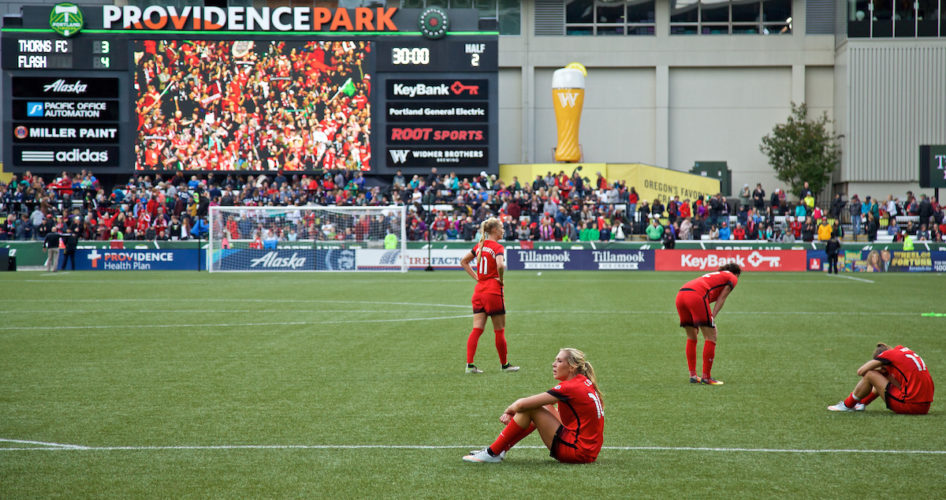
Once earlier this year, they were this:
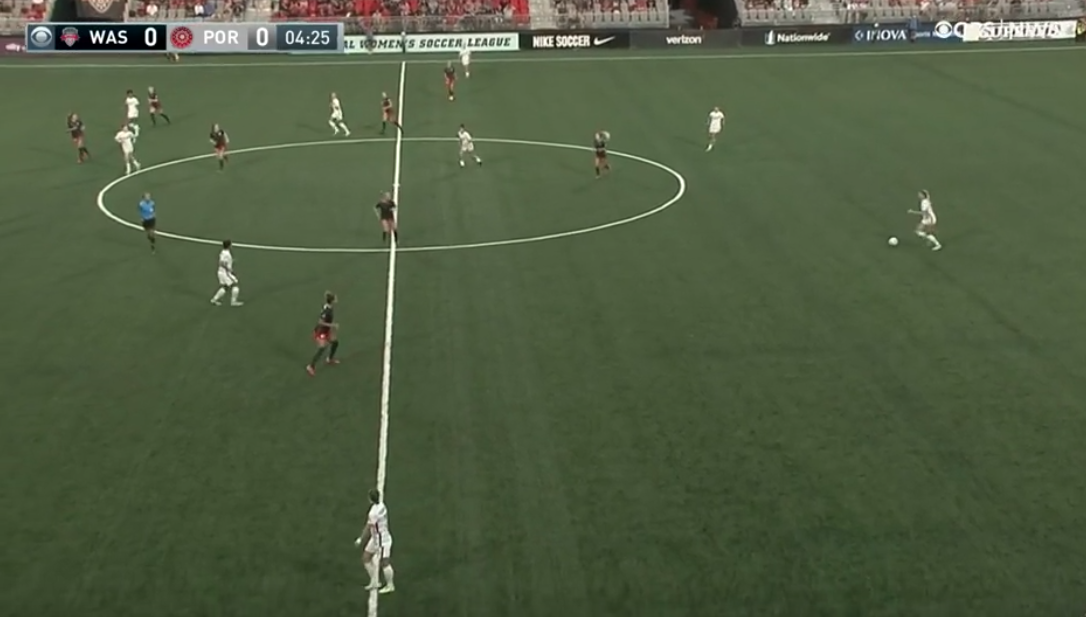
Another time, they were this:
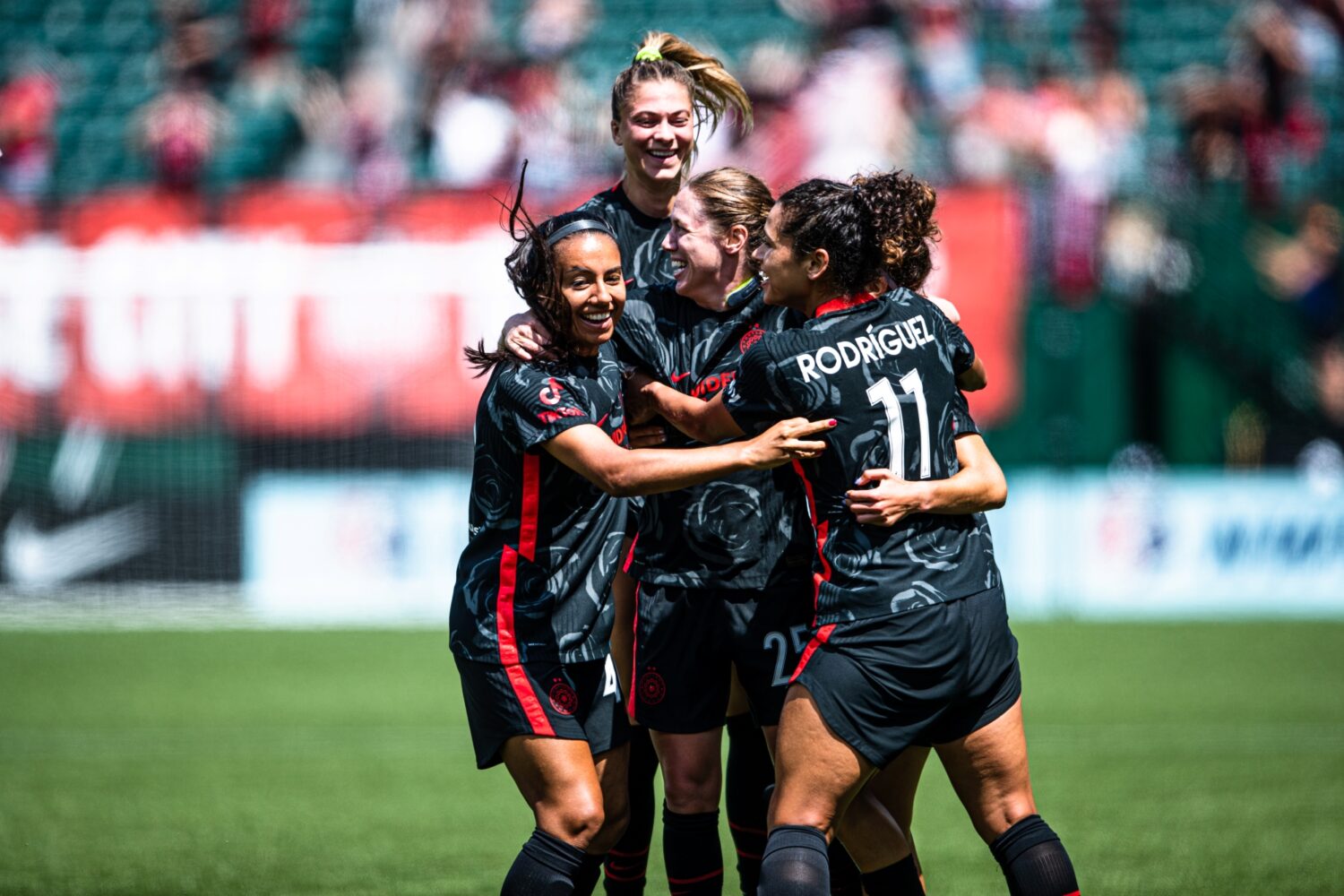
So right at this moment, what are the Portland Thorns? Where can I go to see them?
Inevitably, we have to conclude that they do not exist. We use their name as a semantic convenience, but it does not point to any continuous thing. The Thorns are not Mark Parsons, AD Franch, Midge Purce, or “Iko Iko”. Nor are they Sophia Smith, a big red drum, Gavin Wilkinson, Rhian Wilkinson, or even Christine Sinclair. They are not a pressing team or a counterattacking team. They are not defensively sound, nor do they have trouble finishing. They are simply there, or not.
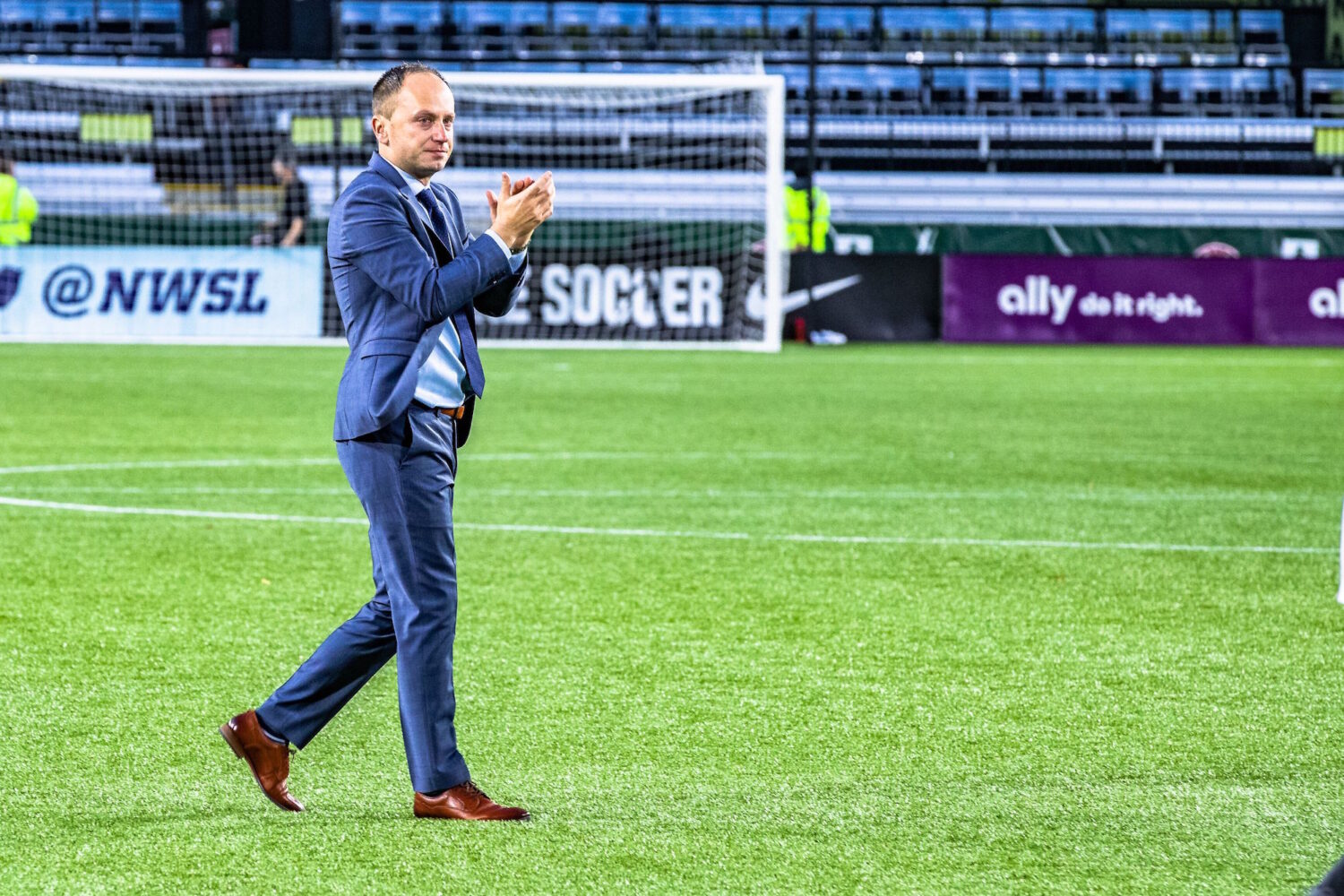
The supply of suffering is infinite. It is the sting of a playoff loss, the sunburn one gets at an afternoon game in August. It is when Tobin Heath’s rights get snapped up in an expansion draft for no good reason.
We cannot stop these things from happening (please do wear sunscreen). Pain will happen. Loss will happen. Suffering is adjacent, but different: its root is in clinging. We cling to players and coaches, clearly. We cling to the idea of winning everything, to the high of a championship, to the moment when a player is one on one with the keeper and is surely, surely going to score. There is nothing here (see above). It’s like trying to scoop up sand with a sieve. Once we understand this, we can begin to get free.
It is only in letting go that we can fully experience anything. If we relinquish expectation, we start to feel that the very fact of the game is a miracle. The weight and texture of the ball, the sun and the rain, the existence of feet. We see that the moment a player is one on one with the keeper is a spark of magic, regardless of what happens next (what happens next doesn’t exist, until it does). The goal itself is an unalloyed joy, if we let it stand by itself.
Even the pain of loss, if we look at it right, is a thing to experience, to open ourselves up to. It doesn’t last. Or you might feel it today, but not tomorrow, and then again the next day. It is not us.
In this way, nothing is ever old. Everything is as new as the moment when we take it in. The world is remade in each moment, and so are we. May we always remember this. May we never feel old.
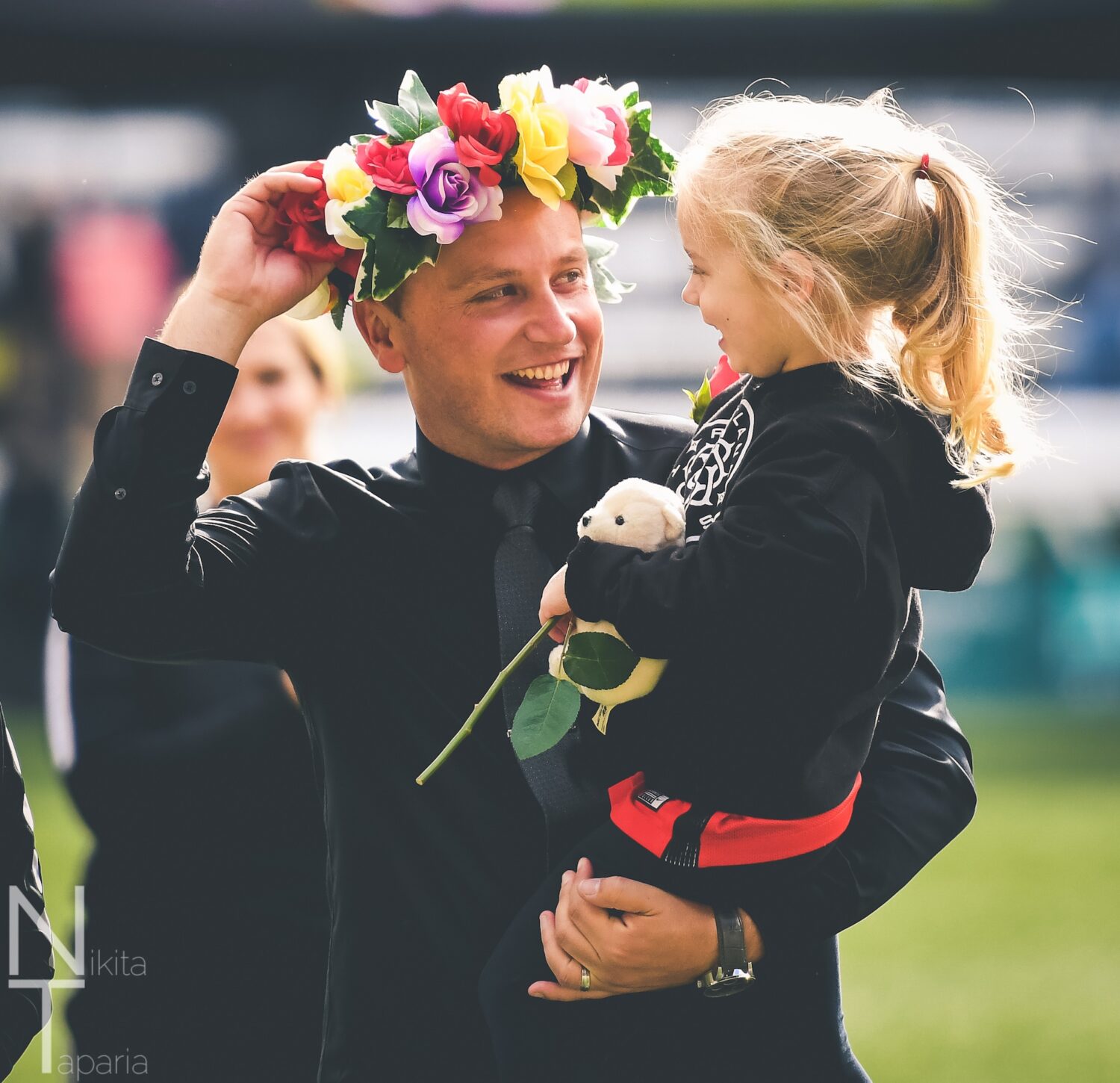
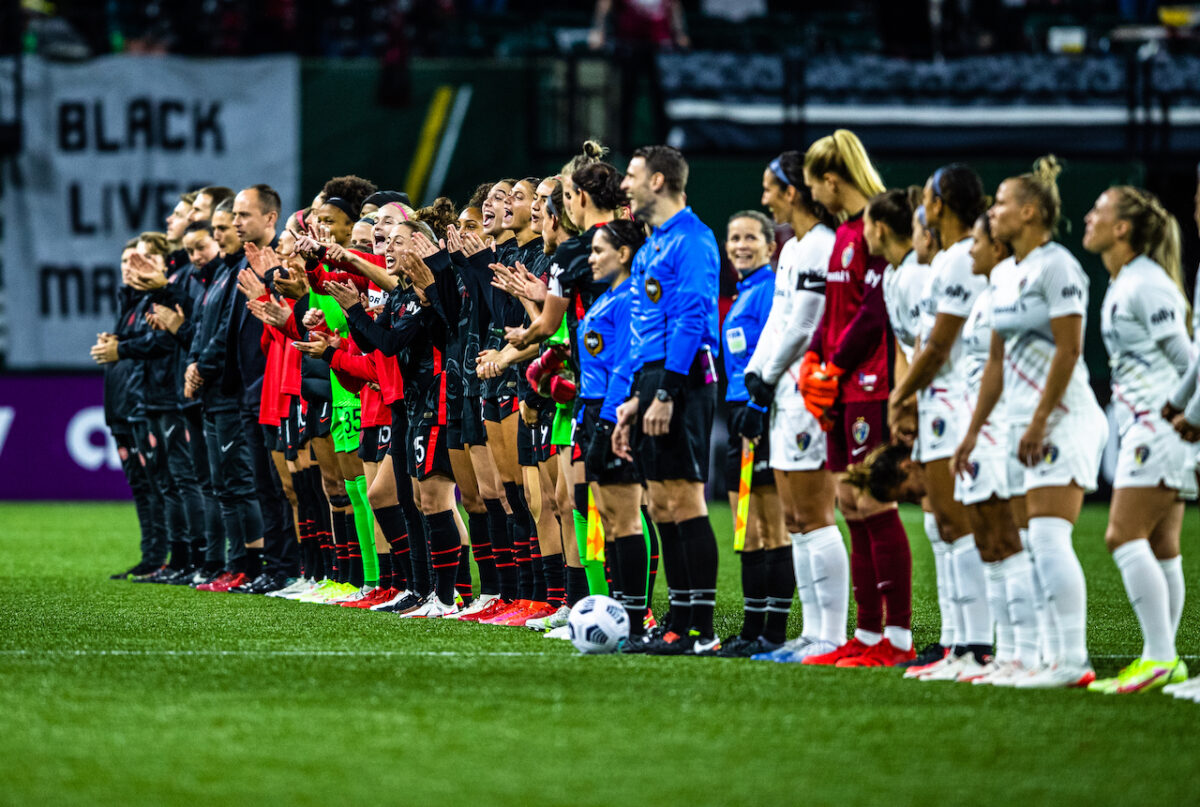
TW mention of suicide
Watching the Portland Thorns and Chicago Red Stars semi-final alone in my dorm room in Los Angeles, I felt numb. From the kickoff, something was off in the final third. The Thorns weren’t themselves. They seemed to be getting inside their own heads and psyching themselves out. While the stats showed the Thorns absolutely raining shots down on Chicago’s goal—21 to Chicago’s five—none of them were particularly threatening. It didn’t feel like the Thorns deserved to score.
I wasn’t “having an okay time” seeing the team struggle on the field. They weren’t fighting for the ball as if their season depended on it, which it did. Maybe it was Lindsey Horan’s sudden freak injury or Crystal Dunn’s pregnancy announcement, but the personnel on the pitch seemed as though they had hardly played together.
The Thorns haven’t had the best run of play leading into the playoffs; despite winning the shield, they won only three of their last 11 games. Ever since Paul Riley’s predatory behavior was made public, there has been a weight on the league that won’t lift. In the postgame, Emily Menges said that the team has done a great job of leaving these traumas off the pitch and focusing on soccer when they’re playing. I have to take her word for it, since I’m not in the locker room. However, I can’t help but think of the extreme mental toll that’s been taken on the players.
Trauma and abuse as severe as what the players in the league have been through forges intense bonds between people. The foundation for that bonding was already in place. The Thorns have praised their team chemistry and culture throughout the season, saying that they are a team unlike they have been in the past and that they truly believe in one another.
But Menges and Christine Sinclair were on the team back in 2015, too. Having to relive terrible experiences while simultaneously working your job at a place that is entwined with toxicity is impossible for me to imagine, yet these players have done it.
They end the 2021 NWSL season with three of four trophies, which is an incredible feat they should be proud of.
And yet, I think all these players need a long break. I’m not saying that it’s great that their season was cut short and that they are off now, but from the outside, it’s a bit of a relief.
I’ve been through my own mental health struggles, which I wrote about for my school newspaper. I played soccer for 12 years at the club and high school levels, but had to quit due to the incredible pressure placed on me by my coaches and the toxic atmosphere my teammates created. Watching the game on Sunday, I couldn’t help but worry that this heavy NWSL season would turn players away from the league—or even from the sport they love altogether. I don’t want to make assumptions about what the players are going through, but I can’t help thinking about it in the context of my own experiences.
After Chicago scored their second goal and the ref made several bad non-calls, the numbness overtook me. One aspect of the broadcast that particularly got to me was the repeated replays of the goals scored against Bella Bixby. Having only jumped up to first keeper midway through the season, the semifinal was her NWSL playoff debut. The Thorns’ playoff hopes rested on her shoulders. She was visibly frustrated after both goals, and the commentators talked about her reaction as the film looped. The broadcast even lingered on her after goal kicks, as if to implicitly blame her for the scoreline. As soon as the final whistle blew, the camera panned to Bixby, who was overcome with emotion. The camera stayed on her face far too long, and I, too, started to cry.
Midway through Mark Parsons’s final media call as head coach of the Thorns, Bixby announced on Twitter that her father had died by suicide earlier that week. The rest of the world fell away as I read that. I barely registered another word that Parsons said. I knew exactly what Bixby was going through, and I couldn’t believe that she had just managed to play the most important game of her career.
When I was 16, one of my close friends died by suicide, and I couldn’t do anything for weeks. Still, five years later, it’s hard for me to do things we used to do together. I can’t listen to Taylor Swift or have a picnic where we only eat veggie straws or see our horse, Willow, without crying. The mental strength it took for Bixby to go to work, to compete at the highest level, is something I cannot imagine, and I am so unbelievably impressed. It also made me more angry at the ways the broadcast fixated on her emotions. No matter the reason behind the sadness or emotions, they’re not for broadcasts or journalists to turn into content.
When I lost my friend, I hated how people asked my mom, “oh, how is Jaiden doing?” for weeks. It never felt like genuine concern, just morbid curiosity. Like I was a museum piece.
I’m sad for the team, and how their season ended. There will not be a Thorns team like them again, with Parsons leaving and a roster shakeup inevitable with a double expansion draft next month. I’ll be sad to see people go, but I also know that the culture and community that the team has worked hard to create will inevitably be broken up. Losing that sense of safety and community so suddenly is hard to deal with.
Even with the team splintering off in the off-season, I hope they are still able to lean on one another as results of investigations are revealed. I particularly hope that Bella Bixby has people to support her. Having a group of people you can lean on no questions asked is one of the best tools for grieving.
I don’t have much to say about the soccer played in that semifinal. But I do know that when you lose someone to suicide, it feels like the earth has stopped spinning.
If you suspect someone is suffering from suicidal thoughts or ideations, ask them about it point-blank. It’s uncomfortable, but it’s so much worse to regret that you didn’t ask. People who are suicidal feel as though they have no one to talk to. Showing them you’re the person they can talk to might save their life.
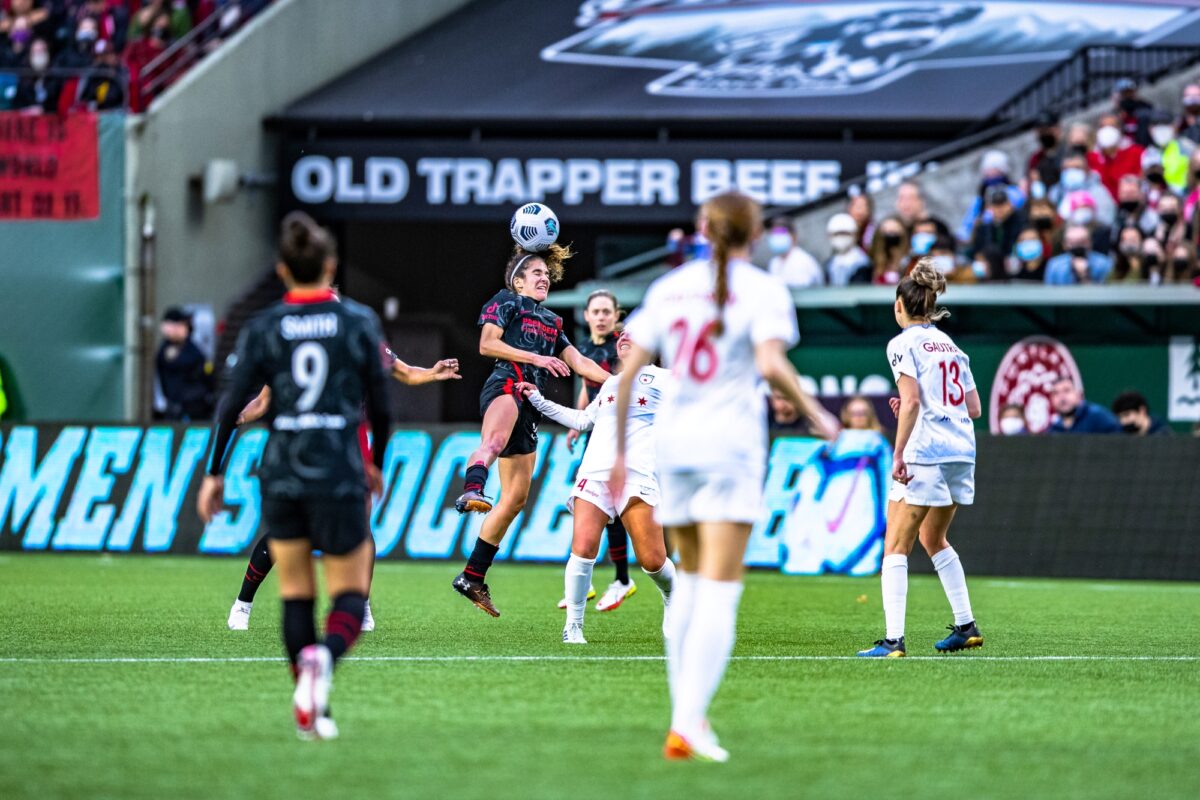
The Thorns fell to the Chicago Red Stars 2–0 in their semifinal match at Providence Park on Sunday. Despite both teams taking a major last-minute scratch—Lindsey Horan sat out the match after suffering an injury the day before, and Chicago was without Mallory Pugh due to COVID-19 protocol—the Red Stars were able to execute their game plan, and the Thorns saw yet another match where they struggled to put the ball in the back of the net.
It was a rough game in that the Thorns kind of knew what Chicago was going to do in advance—if not the exact game plan, at least some of what they’d be coming up against—but they weren’t able to do enough to actually counteract that strategy.
“Our last match against Chicago, I thought they did a really good job of keeping us to one side,” Becky Sauerbrunn said in a press conference ahead of the semifinal game. “They kind of invited us to play to one side of the field and then really committed numbers and kept us over there, and it was difficult to switch the play. So for us, it’s identifying open players, it’s identifying the space that we can capitalize on and how we can get the ball there. I think if we can do that we can do that successfully and relatively risk-free, that will really help us in our build up.”
And Chicago did the same thing this time around.
“They’ve turned up into probably the hardest place to play against probably the hardest team to play,” Mark Parsons said of Chicago’s semifinal performance. “Very stingy, very disciplined, very organized performance, and they’ve got a great result.”
The Red Stars applied pressure early, cutting off spaces and staying touch-tight on Sophia Smith. For their part, the Thorns saw some success when they were able to break up a Chicago attack, switch the ball, and counter up the other side of the field, but the Red Stars were able to limit the moments where that happened from early on.
“Chicago did a really good job of keeping a lot of people in their box,” Emily Menges said after the game, “and it was really hard to get anything clean off.”
It’s not that the Thorns were bad—they generated a fair number of chances and managed to play out of Chicago’s press enough to get a couple really solid looks on goal—but, even as they found more chances, they did do the thing they’ve been doing all year where they shoot a lot and don’t have all that much to show for it. Despite a 21–5 shot line and an xG total that played heavily in their favor, the Thorns just weren’t able to find the back of the net.
xG Race Plot for @ThornsFC v. @chicagoredstars!#BAONPDX #MKOT #PORvCHI #NWSL pic.twitter.com/mbOI1pmajg
— Arielle Dror (@arielle_dror) November 15, 2021
But beyond the stat lines, it wasn’t a game that felt good. Kealia Watt was subbed off for Chicago after she went down a little before the 30-minute mark, and goalkeeper Cassie Miller went down a couple minutes after that.
And then there was the Red Stars’ first goal: an (admittedly very good) shot from Katie Johnson that deflected weirdly off Bella Bixby’s hand and inside the near post in the 37th minute. And then Chicago struck again when Morgan Gautrat found an open Sarah Woldmoe outside of Portland’s box, and Woldmoe snuck her shot from distance past the Thorns’ defense and inside the near post.
Again, it wasn’t that Portland were bad in the closing 30 minutes of the game, but they weren’t able to do enough to win back either of the goals or to prevent the game from ending in a 2–0 loss and Chicago moving onto the final.
“The ball didn’t bounce for us in the 18 tonight,” Christine Sinclair said after the match. “We created a lot of half chances, a lot of crosses, but we just weren’t on the end of them.”
That’s how it goes in soccer, sometimes.
It’s a tough note to go out on, especially with Parsons set to leave for the Netherlands and the inevitable roster shakeup that comes with two expansion drafts and a new head coach, especially after the fallout of the front office covering up Paul Riley’s abuse, especially with Bixby playing through her dad’s passing just days before—and especially when the Thorns had set out to win everything this season and ended up falling just short.
